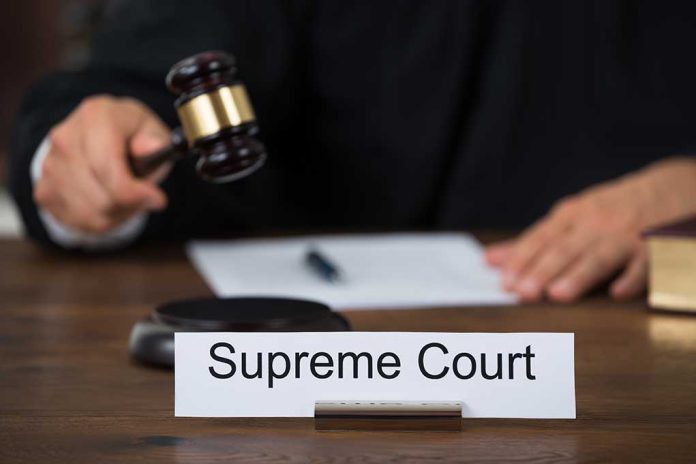
Supreme Court delivers justice to combat veterans in a unanimous 9-0 ruling that eliminates time barriers for claiming combat-related special compensation, potentially benefiting thousands of PTSD-affected veterans previously denied their full financial due.
Key Takeaways
- The Supreme Court unanimously ruled that the six-year statute of limitations does not apply to retroactive claims for combat-related special compensation (CRSC).
- This landmark decision directly impacts thousands of veterans, especially those with combat-related PTSD, who can now claim benefits dating back to when their entitlement began.
- Justice Clarence Thomas wrote the 9-0 opinion in Soto v. United States, overturning the Federal Circuit’s previous ruling.
- An estimated 9,000+ veterans previously denied full back pay may now pursue additional tax-free benefits they were rightfully owed.
- The case originated with Iraq War veteran Simon A. Soto, who sought CRSC payments for trauma suffered while recovering remains of fallen soldiers.
A Victory for Combat Veterans
The Supreme Court has delivered a decisive victory for America’s combat veterans. In a unanimous decision issued on June 12, the Court ruled that the typical six-year statute of limitations for filing claims does not apply to retroactive combat-related special compensation (CRSC). This ruling has far-reaching implications for thousands of veterans nationwide who have been shortchanged on benefits they earned through their service and sacrifice. The decision is particularly meaningful for veterans suffering from post-traumatic stress disorder (PTSD) and other combat-related conditions who often face delays in diagnosis and treatment that previously put them beyond filing deadlines.
“We hold that it does, and thus that the settlement procedures and limitations established under the Barring Act do not apply to claims for CRSC payments,” wrote Justice Clarence Thomas in the Court’s opinion.
The case, Soto v. United States, centered on Iraq War veteran Simon A. Soto, who was diagnosed with PTSD after his service recovering the remains of fallen soldiers. Soto’s petition claimed he was entitled to 8½ years of retroactive payments, but the Navy limited his compensation to just six years, citing the statute of limitations under the Barring Act. This restriction prevented Soto and thousands of other veterans from receiving their full entitled compensation, spurring a class action lawsuit that has now culminated in this watershed Supreme Court decision.
The Human Cost of Combat
Simon Soto’s case highlights the devastating psychological toll of combat service. As part of a mortuary affairs unit in Iraq, Soto was tasked with recovering the remains of fallen service members – a duty that exposed him to unimaginable trauma. His responsibilities included what he described as the grim task to “search for, recover, and process the remains of war casualties.” The horrific nature of this work became evident in Soto’s testimony about processing “over 300 pieces of five or seven soldiers” – experiences that led to his PTSD diagnosis.
“The CRSC statute is just such a law. It authorizes the Secretary of the military department to determine eligibility and calculate the amount payable. The Barring Act therefore does not apply,” Justice Ketanji Brown Jackson wrote in the Court’s opinion.
While the Biden administration and Pentagon bureaucrats had fought to maintain the six-year limitation, President Trump has consistently championed expanding veterans’ benefits and cutting red tape that prevents our heroes from receiving the care they deserve. This Supreme Court ruling aligns perfectly with Trump’s commitment to ensuring veterans receive the full compensation and respect they’ve earned through their service to our nation. The decision represents a significant step toward fulfilling Trump’s promise to take care of those who’ve sacrificed for America.
Far-Reaching Impact for Thousands of Veterans
The implications of this ruling extend far beyond Soto’s individual case. More than 9,000 veterans previously affected by the six-year limitation can now pursue claims for additional tax-free benefits. This is particularly significant for veterans who experienced delays in receiving VA disability ratings, were unaware of their CRSC eligibility, or faced application processing delays. The ruling makes clear that eligible veterans can claim compensation dating back to when their entitlement began, even if that period exceeds six years.
“The U.S. Supreme Court ruled unanimously on June 12 that a federal law’s six-year statute of limitations that often applies in military-related claims does not apply to retroactive claims for combat-related special compensation (CRSC).”
The path to this victory was not straightforward. After Soto filed his class action in 2017, a federal district court ruled in his favor in 2021. However, the Federal Circuit reversed this decision earlier in 2024, reinstating the six-year limitation. Now, the Supreme Court has definitively overturned that reversal, sending a clear message that technical time limitations should not prevent combat veterans from receiving their earned benefits. Veterans previously denied full back pay under CRSC should immediately revisit their claims, potentially with legal assistance, to ensure they receive all compensation they’re entitled to under this new ruling.







